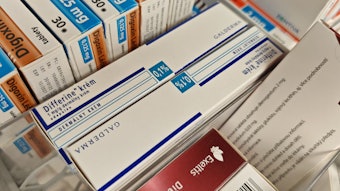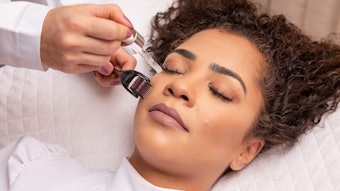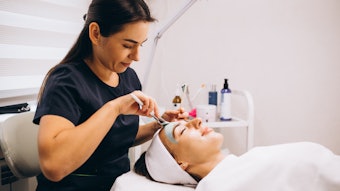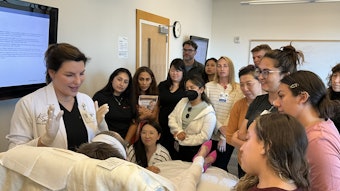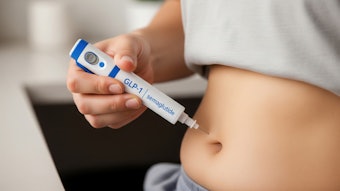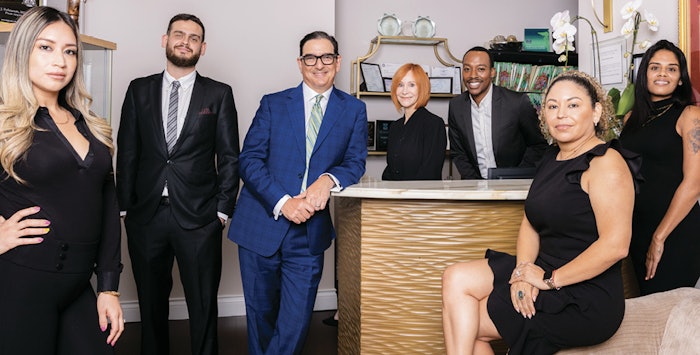
In a recent drive-through plastic surgery video, created by noted Miami plastic surgeon Adam Rubinstein, M.D., he explores the dangers and issues with this controversial method.
"I’ve been victimized for taking stances; I’ll stand up and call out clinics or call out doctors who maybe aren’t sharing the total truth about themselves, or marketing themselves in disingenuous ways," he says. "Not everyone is willing to do that. But, I feel it’s important and it’s part of who I want to be as a doctor."
That’s something that he knew he wanted from a young age. And once he knew he wanted to be a doctor, his mind turned to the specific branch he wanted to follow. To help him decide, while in high school, he volunteered in the emergency room of New York City’s Mount Sinai Hospital.
"I immediately was drawn to the surgical side," he recalls. "When I was volunteering one day, a young girl around 9 years old was brought into the ER, having caught her finger in a door, and the tip of her finger was chopped off. Her very nervous parents came in with the tip wrapped up, and the plastic surgeon resident came in, and sewed the tip back on, perfecting every stitch."
It struck him that if he was going to be a surgeon, that’s the type of surgeon he wanted to be—someone who pays attention to the little details and tries to achieve as perfect a result as possible.
He attended the Saint Louis School of Medicine, graduating in 1996, and following it up with a fellowship in pediatric craniofacial surgery, and a fellowship in hand and microsurgery. It was always his plan to start his own private practice and a solo one at that.
"I had a few small businesses growing up, so I’ve always been an entrepreneur and didn’t really fear having my own practice in any way," Dr. Rubinstein says. "I just knew I wanted to control my destiny, work hard and bust my hump to get ahead. I felt like the best way for me to do that was by starting my own practice."
BUILDING A LEGACY
There was nothing terribly unique about the way Dr. Rubinstein built his practice, opting for a more traditional path.
"Back in my day, it was still a time of taking a lot of calls, running from emergency room to emergency room, getting your experience, and that’s what I did," he says. "I had privileges from lots of hospitals throughout Miami—everything from South Miami into Fort Lauderdale."
That included several children’s hospitals, where Dr. Rubinstein worked on pediatric patients, helping to make their lives better.
"I was one of very few people covering hand surgery throughout South Florida, and even fewer people willing to do replants," he says. "I had tons of experience in replants, so when I was on call, it was very common for me to attempt finger replants pretty regularly."
Dr. Rubinstein’s practice is still near the same Northern Miami location where he started, though he has grown and evolved the Aventura practice through the years.
"What helped was working hard and just doing things the right way—trying to take great care of people and caring about what you do," Dr. Rubinstein says. "I put my heart and soul into my work and people noticed. I was very flattered to have people referred to me from people I worked with at the hospitals—nurses, anesthesiologists, and anyone who I came into contact with could be a referral source. Karma comes around to you."
The practice opened almost 20 years ago, so having a website was just becoming important, and Dr. Rubinstein took time to make his site standout with eye-appealing graphics and incorporating video—which wasn’t very common at the time.
"I also hosted a radio show for three years called ‘New Reflections,’ which was a lot of work, and a lot of fun, and that was an extension of things I had done before, and I could talk about things that were interesting, new or controversial, educate people, and have interesting and sometimes contentious conversations," he says. "We did everything from laser machines to hair products, and I even had people from Crest talking about their whitening technology."
But, Dr. Rubinstein wasn’t shy from talking about controversial topics or tough issues, and that’s something he continues to do today on social media and other media.
"I spend a lot of time and energy trying to debunk bull and trying to help people know what’s real," he says. "It’s so easy for people to be fooled and harmed. I don’t care where people go, but I want them to have great results and good experiences. I think it lessens our profession when someone has a bad experience, and it reflects on all of us. That’s why I spend so much time and money to tell people the truth."
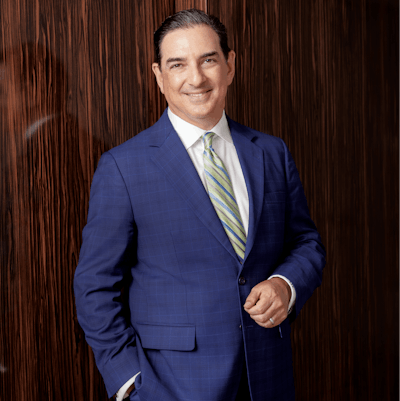 Miami plastic surgeon, Dr. Adam Rubinstein
Miami plastic surgeon, Dr. Adam Rubinstein
TALK THE TALK, WALK THE WALK
Dr. Rubinstein remains passionate about his mission to educate the public about plastic surgery and has been a very outspoken patient advocate through the years, never afraid to speak out about botched plastic surgery, unsafe conditions or questionable clinics related to patient deaths. In fact, a lot of Dr. Rubinstein’s time has been about educating the public on making good choices. His social media accounts and website are full of important information and his thoughts on such matters, especially his own Instagram account, where he posts about such matters—#it’sNotAllTheSame. And another called Plasticsurgerytruths, featuring Q&A videos to educate the public on anything to do with aesthetics.
"It’s not an outlet I use for marketing purposes," he says. "I use it purely for education. People have tough decisions to make and we’re at a time when the internet is this wonderful source of endless information, not all of which is accurate and good. If I can help dispel myths or weed through the garden of misinformation, that’s worth it to me. Someone has to stand up and say when the emperor’s not wearing clothes."
Some of his views are also expressed on the Lifetime TV show, "My Killer Body with K. Michelle," in which he works with patients who often had horrible situations and couldn’t get the help they needed.
"I have a lot of patients who seek me out if things didn’t go right elsewhere, and these are challenging cases; harder than primary cases but more rewarding, because this is someone who had a rough go, sometimes really bad," he says. "I’m able to help them and improve their situation. The show was really educational for those who might find themselves in similar situations, or better yet, avoid getting in those situations by making better choices."
Discussions on a second season of the show are ongoing, and he might have his own show in the future as well.
STRONG LEADER
With 10 people on his staff, Dr. Rubinstein advocates for a common culture at the practice, and that revolves around providing the highest level of care to treat people in the best way possible.
"It’s a culture that everyone has to buy into, or it doesn’t work," he says. "My staff is split really into two sections—the front office staff that runs the clinic; and my OR staff who is day-of-surgery care. Both teams need to have that high standard in mind. Yes, I’m the guy whose name is on the door, but I don’t run my practice in an authoritative way. I set the standard and try to conduct myself with the highest standards and ethics."
For people who walk through the door, Dr. Rubinstein has created a "comfortable" setting.
"I don’t like people having to wait very long, and we try to run the schedule so that when someone enters the office, they might start some of the paperwork in the reception area but more often than not, we are trying to get them into the consultation room so they can have some private time and sit more comfortably," he says. "We give everyone a good welcoming experience."
The practice is in the penthouse of a building that overlooks the Causeway cutting across to the beach. It’s decorated in soft tones, with nothing too aggressive in décor, meant to be understated.
"My practice is boutique, we are one of the high-end practices around and people pay more to come see me and have me take care of them, because they know they’re going to get the highest level of care," Dr. Rubinstein says. "We treat them that way from the moment they walk in for their consultation to the moment they walk out of their last follow-up. And there’s a value to that. We don’t try to compete with the low-budget clinics."
A BASEBALL FANATIC
It’s not all work for the good doctor. Dr. Rubinstein loves sports and being in Miami gives him ample time to play and watch professional sports, having tickets to the Marlins, Dolphins and Panthers.
A lifetime lover of baseball, he enjoys flying out to New York to see the Yankees play whenever he can, and he’s even been to Yankees Fantasy Camp, getting the opportunity to play with some of the Bronx Bombers legends. His passion for baseball is also shared by his 14-year-old son, who plays travel ball, and Dr. Rubinstein is constantly seeing his son play in tournaments and games. His daughter recently graduated high school and will be starting at Emory in the fall.
"My wife is as busy as I am; she’s a very successful attorney and a managing partner of the Miami office of her firm," he says. "She is Wonder Woman and puts in as many hours as I do. We have a very loving and accomplished family."
LOOKING AHEAD
Dr. Rubinstein travels around the world lecturing a great deal, recently coming back from places like Vienna, Paris and Monaco, and he has plans for more conferences in the year ahead. As he thinks about what’s next for the practice, Dr. Rubinstein just sees more of the same level of service and doing things the right way.
"One of the things that I think has always differentiated my practice, has been the interest and willingness to try out new technology," he says. "I have been on the front line of new technology for many years, so when there is some new branch of technology that is helpful, I’m one of the first guys in the country to be using it, and consequently talking about it and sharing what I’ve learned."
Keith Loria is a freelance writer based in Oakton, VA.


